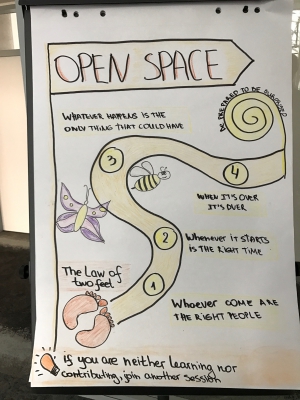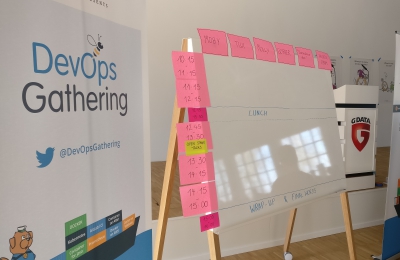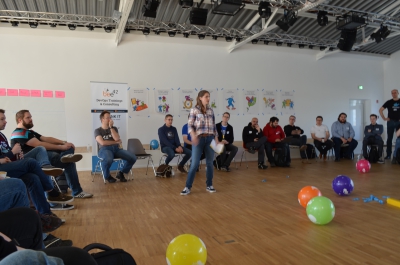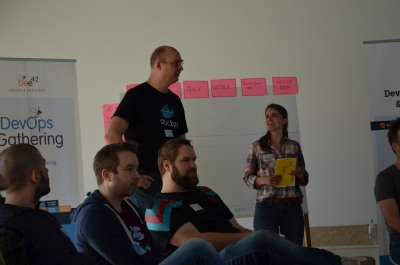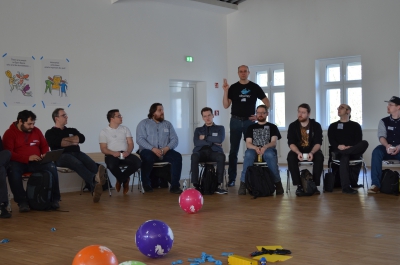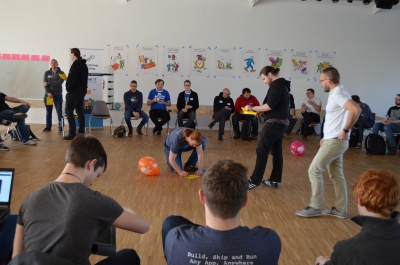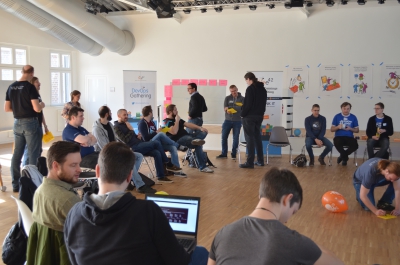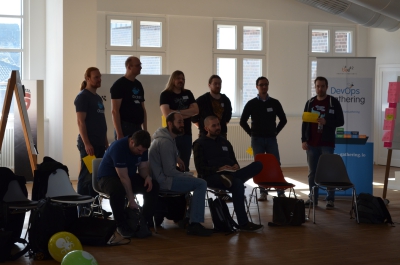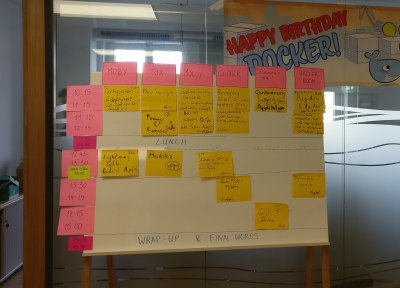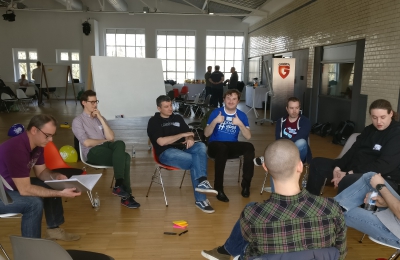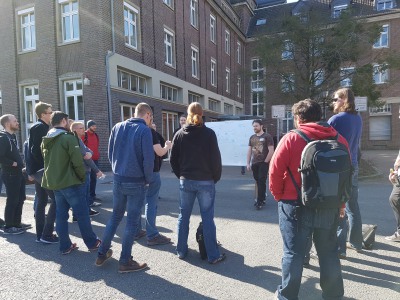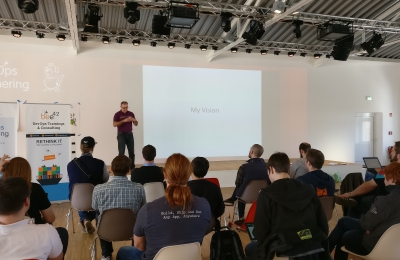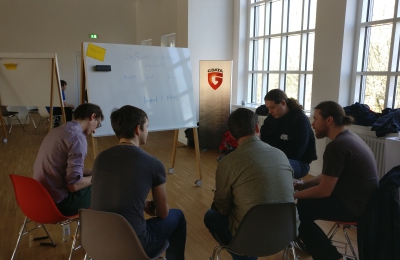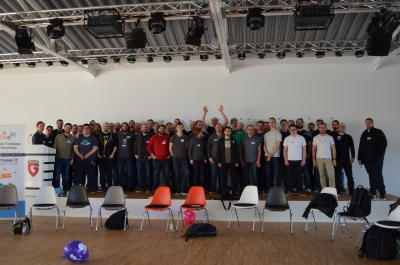DevOps Gathering 2017 - Container Open Space
In the previous blog post we took you with us to the workshop day and conference day of the DevOps Gathering last week.
In this blogpost you’ll get to know all about the third and last day of the conference DevOps Gathering: The Container Open Space!
But what is an Open Space and what had the attendees to bring with them to take part in this Open Space? The answer is: Only them, good ideas and curiosity! And before we will tell you what happened on Saturday, we’d like to introduce you first to the format of an Open Space:
Open Space - What is that?
An Open Space is a simple and productive way for hosting knowledge events. Participants and experts create and manage together their own agenda of parallel working sessions. The goal of this Open Space is to allow attendees to interact with one another and learn from each other – all under the guidance of an experienced moderator.
Here you can find some links, definitions and videos we’ve collected for you:
- Definition of Open Space Technology (Wikipedia): https://en.wikipedia.org/wiki/Open_Space_Technology
- Open Space concept explained (in English): http://openspaceworld.org/wp2/explore/open-space-key-concepts/
- Video and explanation of Open Space (in German): https://www.youtube.com/watch?v=eZD0PtnN1vQ
- Video and explanation of Open Space (in English): https://www.youtube.com/watch?v=M_jhcvCYBbg&t=1s
Open Space - What will happen
We never know exactly what will happen when we open the space for people to do their most important work, but we can guarantee these results when any group gets into Open Space:
- All of the issues that are MOST important to the participants will be raised.
- All of the issues raised will be addressed by those participants most qualified and capable of getting something done on each of them.
- In a time as short as one day, all of the most important ideas, discussion, recommendations, conclusions, questions for further study, and plans for immediate action will be documented in each session.
- At the end, all results of each session will available and briefly discussed with all participants of the day. AND… results like these can be planned and implemented faster than any other kind of so-called “large-group intervention.” It is literally possible to accomplish in one day what some other approaches take weeks or months to do.
To lead an OpenSpace Talk
- Come up with an interesting topic and title for your discussion. You don’t need to develop these before the conference; most of the ideas will come to you during the event, but be prepared this is also an option.
- Fill out a schedule Post-It for your topic.
- Place the topic on the schedule.
- If you see topics that have something in common, consider combining them into a single time slot.
- If a significant number of people want to attend your discussion and another discussion in the same time slot, try to trade into another time slot to ensure maximum dialogue and participation.
- To attend an OpenSpace Talk:
- Check the schedule and sign up for a talk or just drop in if you wish. Use the ‘Law of two feet.’ If you feel that you are not contributing or benefiting from a presentation, please feel free to move on to something else. Allow the discussion convener to steer his or her topic. If you have an opposing opinion that needs a full time slot you should feel free to add your own OpenSpace slot to discuss the topic.
Many Thanks to Yuliana (y.stepanova@setlog.com)
Rules of an Open Space
- Whoever shows up is the right people
- Whatever happens is the only thing that could have
- Whenever it starts is the right time
- When it’s over, it’s over
DevOps Gathering 2017 - Container Open Space on March 25, 2017
The DevOps Gathering Open Space format was a perfect fit to the fast moving development of the container ecosystem. It offered participants and experts the opportunity to launch discussions, address questions and challenges regarding Docker, Kubernetes and Cloud technologies.
The topic of our Open Space was: What technical challenges emerge with Docker and Kubernetes?
Among others, we addressed the following questions:
- Do we know and proper use the benefits of existing solutions?
- What experience do we already have with Docker or Kubernetes in production?
And here we like to show you some selected topics and session the participants and groups discussed and interchange about:
- Configuration & Deployment hell (and how to avoid it)
- Dev Sec Ops
- Monkey & Bananas in DevOps
- Software is eating the world (Impact & Ethics)
- How to integrate DevOps into Scrum team?
- Bringing Docker to your beginners team
- Creating Kubernetes Clusters easily and running cool stuff on top
- Containerizing Legacy Applications
- CI and Docker
- PromQL basis
Furthermore we had a hacker room for practitioners among the participants and there our experts Peter Roßbach, Dieter Reuter, Niclas Mietz and Lucas Käldström guided our attendees through some practical stuff:
- Set up a big ARM cluster up & running
- 30 Raspberry PI 3 (w/ 32bit and 64bit HypriotOS)
- 2 Up Boards
- ODROID-C2 Boards
- C.H.I.P. and Pi Zero Boards
Connect a Kubernetes and Docker Swarm in one big cluster
Use Traefik as external ingress loadbalancer
Automated integration test with Spring Boot and a dockerized database
After some hours we had setup the basic ARM containers (https://github.com/bee42/docker-on-rpi-lab), flashed and connected all machines at the network. Cool, but we can’t find a simple solution to connect the Docker swarming network with the Kubernetes flannel one. We need more hacktime to fix that :-) We’ve learned a lot of mixing container ARM cluster setups and migrate them.
Open Space - Lighting Talks
In addition to the Open Space we gave the participants the chance for lightning talks. At every event a lot of attendees have idea for some other talks or topics they like to introduce to the other participants. So we gave them the chance to bring their most interested topic to the audience. The participants had 10 minutes to talk about their tool, project or experience with container and DevOps.
Here are the lightning talks we had on last saturday:
- “Radical Agility” by Jan Stroppel (Zalando)
- “Mokikz” - a project by Wolfgang Lang (SEAL Systems), where he make technology and programming accessible for the kidz (https://github.com/Mokikz/ldu)
- “Acceptance Testing using Selenium and Docker” by Kevin Wittek (G Data)

